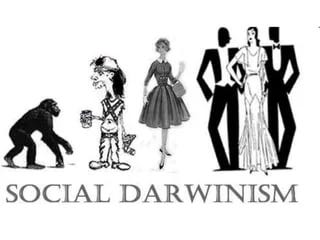Neo Social Darwinism

🌈 Abstract
The article discusses the concept of "Neo Social Darwinism" - the idea of applying evolutionary theory to personal and collective choices, and how this has been viewed and debated over time.
🙋 Q&A
[01] Neo Social Darwinism
1. What is the core idea of Neo Social Darwinism according to the article?
- The core idea of Neo Social Darwinism is that in order to promote things you want to last long after you die, you need to promote things now that can either last into the future themselves or promote other things that will last, and natural selection can advise you on how to do this.
- The article states that "you will mostly need to guess the directions that future evolution will go, and find moves now to tilt this process more toward evolving stuff that will later more promote X. In general, your inclination to promote X now suggests that the people most likely to promote X in the future will be people like you. So promoting the evolution of more like you is a common way to promote future X."
2. How does the article address common criticisms of Neo Social Darwinism?
- The article addresses several common criticisms:
- Claim that it is impossible to usefully predict the future - the article cites the "Age of Em" as evidence against this.
- Claim that morals are independent of evolution - the article argues that this claim makes less sense now that we see morals as arising through cultural evolution.
- Claim that using evolutionary analysis to inform policy is "pseudoscience" - the article argues this is no less scientific than most other policy analysis.
- Claim that Neo Social Darwinism led to Nazi war, racism, and genocide - the article argues this is not true, as such hostile acts can actually go against evolutionary strategies.
3. What are the key points the article makes about the relationship between Neo Social Darwinism and moral principles?
- The article states that the use of natural selection to analyze policy "does not commit one to any particular choices" and that "one must study the details" rather than making blanket claims.
- It acknowledges that one's moral principles may guarantee certain things are never recommended, but argues that continued cultural evolution may outlive those principles.
- Overall, the article proposes Neo Social Darwinism as a "reasonable and unreasonably maligned stance" for studying how to best participate in and promote the Darwinian struggle for existence.
[02] Opposing Views on Social Darwinism
1. What are the main ways the article describes opponents of applying evolutionary theory to policy? The article outlines several ways opponents have tried to resist applying evolutionary theory to policy:
- Denying evolution in general
- Arguing their favored policies were actually "winning moves" in the evolutionary struggle
- Claiming humans are an exception where evolution isn't relevant
- Arguing there is a "naturalistic fallacy" that prevents using evolution to inform moral policy
- Declaring the use of evolution to analyze policy as "pseudoscience"
- Blaming evolutionary analysis for causing Nazi war, racism, and genocide (which the article says is not true)
2. How does the article characterize the effectiveness of these opposing strategies? The article states that opponents found more success with the strategies of (C) claiming humans are an exception, (D) arguing the "naturalistic fallacy", (E) declaring it "pseudoscience", and (F) blaming it for Nazi atrocities.
However, the article argues against the validity of these critiques, stating that (F) is "just not true", (E) is no less scientific than other policy analysis, and (D) is not a valid criticism. It acknowledges (C) had some merit given our understanding of human cultural evolution, but argues this can still be incorporated into a Neo Social Darwinist framework.
[03] The Future of Social Darwinism
1. What is the author's proposed "Neo Social Darwinism" and how does it differ from past views? The author's proposed "Neo Social Darwinism" is a more defensible version that acknowledges the limitations of predicting the future, the role of cultural evolution, and the need to study details rather than make blanket claims.
Key differences from past views:
- Recognizes the importance of promoting things that can last into the future, either directly or by promoting other long-lasting things.
- Uses natural selection as a means to inform strategies, rather than as an end in itself.
- Acknowledges the difficulty in distinguishing ultimate ends from powerful general means.
- Does not automatically recommend things like war, racism, and genocide, which the author argues can actually go against evolutionary strategies.
2. How does the author respond to the critique that Neo Social Darwinism is just an excuse for actions people want for other reasons? The author acknowledges this critique, stating that "one may plausibly suspect those who justify current actions in terms of an evolutionary analysis of how to achieve distant future ends of using that as an excuse for actions they want for other reasons."
However, the author argues this critique "also applies to any other framework for justifying acts today in terms of distant future outcomes." In other words, the potential for misuse is not unique to Neo Social Darwinism.
The author maintains that when used properly, Neo Social Darwinism can be a "reasonable and unreasonably maligned stance" for studying how to best participate in and promote the Darwinian struggle for existence.